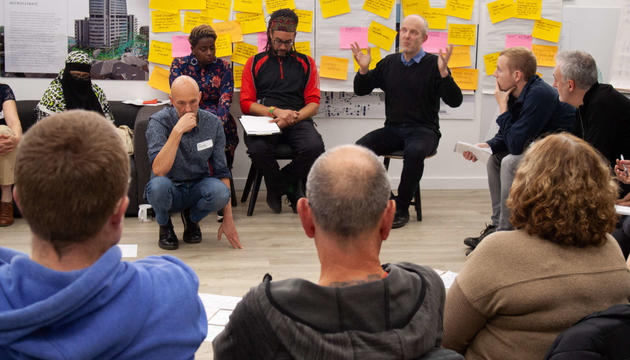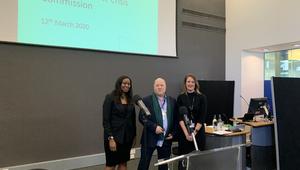
Citizens' assemblies help build social mandate for climate policy
19th March 2020 - 17:23
Should citizens’ juries and assemblies be a “one off” – or should deliberation be included at every stage of climate policy design and implementation? The question was one of the broader issues discussed at an event co-hosted by PCAN and the Centre for Climate Change and Social Transformation (CAST) to address the role of citizens’ juries and assemblies in engaging the public on climate change.
Speakers at the workshop, held on 10 March 2020 at the London School of Economics and Political Sciences, included Rebecca Willis, Professor in Practice at Lancaster University and Expert Lead for Climate Assembly UK (the national Citizens' Assembly commissioned by Parliament), and PCAN investigator Professor Andy Gouldson, who shared his experience of the Leeds Climate Change Citizens’ Jury.
A panel discussion brought together an eclectic range of people including Prof Graham Smith (University of Westminster), Peter Bryant (Shared Future), Christina Demski (University of Cardiff) and Cllr Tom Hayes (Oxford City Council), who contributed their perspectives on using these models of citizen engagement on climate change.
The workshop led to inspiring discussions with the 50-strong audience on whether these activities would have larger impacts on the implementation of climate action through the recommendations that resulted from citizen juries and assemblies. Maintaining engagement with citizens after an assembly/jury and keeping them involved in decisions after the process ends emerged as another key issue.
Dr Candice Howarth, PCAN co-organiser of the event, said:
“This was a fantastic afternoon, rich with insights and critical discussion from people who are on the front line of running citizens’ juries and assemblies on climate change.
“With public and political discourse on climate change having changed over the last 18 months and a wave of climate emergency declarations around the UK, we are seeing a shift in ways the public are engaging on climate change. Citizens’ juries and assemblies are providing an important platform to include them more deeply in decision-making processes on climate change and we heard from experts how effective these processes of democratic deliberations can be.”
Dr Adam Corner, co-organiser from CAST said:
“There's clearly so much energy around engaging citizens on climate change right now. Despite the unexpected development of Covid-19 and the temporary restrictions on physical contact this has meant, I am confident that the energy behind citizens’ assemblies and other types of deliberative engagement will continue, and grow.
“The opportunity here is to build citizen engagement into climate policy like never before, and ensure that climate policies are people-centred and have a strong social mandate.”
Coinciding with the event, CAST published a briefing paper on Climate Change Citizens’ Assemblies, which can be read here.
Find out about the Leeds Climate Commission's Citizens' Jury on climate change here.
Image: Leeds Climate Change Citizens' Jury (Leeds Media Services)




